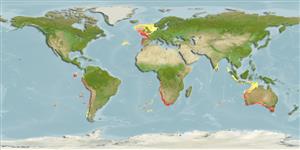Teleostei (teleosts) >
Ophidiiformes (Cusk eels) >
Ophidiidae (Cusk-eels) > Neobythitinae
Etymology: Lamprogrammus: Greek, lampros = light + Greek, gramma = letter, signal (Ref. 45335).
Eponymy: Yuri Nikolaevich Shcherbachev works at the P P Shirov Institute of Oceanography, Russian Academy of Sciences. [...] (Ref. 128868), visit book page.
More on authors: Cohen & Rohr.
Environment: milieu / climate zone / depth range / distribution range
Ecology
Marine; benthopelagic; depth range 0 - 1000 m (Ref. 34024). Tropical; 61°N - (Ref. 36222)
Eastern Indian Ocean: northwest coast of Australia. Southeast Pacific: off Chile. Atlantic Ocean: off French Guiana-Suriname (Ref. 31427), off Angola, and off the Faeroe Islands.
Size / Weight / Age
Maturity: Lm ? range ? - ? cm
Max length : 193 cm SL male/unsexed; (Ref. 31427)
Rare species taken in midwater and bottom trawls (Ref. 34024). Reproductive strategy possibly similar to other members of this family featuring oviparity, with oval pelagic eggs floating in a gelatinous mass (Ref. 205). Minimum depth from Ref. 58018.
Life cycle and mating behavior
Maturity | Reproduction | Spawning | Eggs | Fecundity | Larvae
Nielsen, J.G., D.M. Cohen, D.F. Markle and C.R. Robins, 1999. Ophidiiform fishes of the world (Order Ophidiiformes). An annotated and illustrated catalogue of pearlfishes, cusk-eels, brotulas and other ophidiiform fishes known to date. FAO Fish. Synop. 125(18):178p. Rome: FAO. (Ref. 34024)
IUCN Red List Status (Ref. 130435: Version 2024-1)
Threat to humans
Harmless
Human uses
Fisheries: of no interest
Tools
Special reports
Download XML
Internet sources
Estimates based on models
Preferred temperature (Ref.
123201): 8.2 - 15.9, mean 11 °C (based on 262 cells).
Phylogenetic diversity index (Ref.
82804): PD
50 = 0.5312 [Uniqueness, from 0.5 = low to 2.0 = high].
Bayesian length-weight: a=0.01000 (0.00244 - 0.04107), b=3.04 (2.81 - 3.27), in cm total length, based on all LWR estimates for this body shape (Ref.
93245).
Trophic level (Ref.
69278): 4.0 ±0.7 se; based on size and trophs of closest relatives
Resilience (Ref.
120179): Very Low, minimum population doubling time more than 14 years (Preliminary K or Fecundity.).
Fishing Vulnerability (Ref.
59153): Very high vulnerability (90 of 100).
